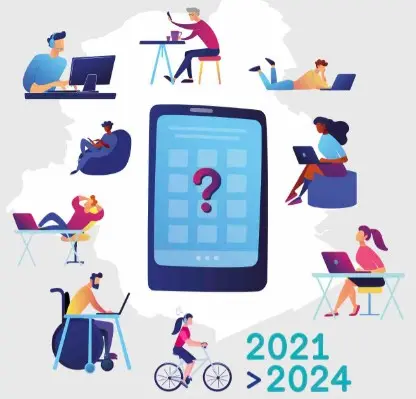"Digital Brussels" joint decree and ordinance
"Digital Brussels" is a significant step forward: firstly, in the way in which our public authorities embrace digital technology to better serve our fellow citizens and, secondly, by offering guarantees relating to physical counters, telephone services and the post when a citizen wishes to communicate with their administration. This step makes the Brussels Region a pioneer in Europe with a text that both advocates for more efficient and accessible public services, and consecrates digital inclusion and the performance obligation to serve all citizens, whatever their relationship with digital technology.
Modern, fast, easy, accessible
Unavoidable since the COVID-19 crisis, digital technology has become an integral part of our daily lives. The rapid and constant evolution of technology has an impact on all aspects of our lives.
By offering the citizens of Brussels the possibility, if they so wish, of carrying out their administrative procedures online, "Digital Brussels" is simplifying and modernising the relationship between the citizens of Brussels and the administrations. Being able to use public services online saves time, for example by avoiding the need to go to your local authority. They also make it possible to carry out procedures 24 hours a day, outside the normal service hours of an administration. Finally, using these tools directly or indirectly speeds up access to certain social rights.
By guaranteeing at the same time support and the maintenance of physical counters, call centres and postal services, "Digital Brussels" also offers the possibility of not using digital channels and ensures that all citizens of Brussels can take full advantage of public services, according to their preferred communication channel.
Digital Brussels: in practice
In practice for citizens of Brussels
"Digital Brussels" provides a framework for digital technology to ensure that all online administrative procedures and communications are designed to be inclusive by putting safeguards in place. In accordance with this, Digital Brussels is introducing new rights. These rights include:
- The right for citizens to carry out all their formalities online, including administrative procedures, communication and forms;
- The right to receive all communication that has a definite date or is registered mail via the eBox.
- The right to withdraw consent regarding the digital channel for communication with the administration at any time.
- The right to support for online procedures.
- The right to at least one alternative to digital technology, through a physical counter, telephone service or by post.
- The right to adequate access and opening hours adapted to the missions and the public according to the public services offered.
If a citizen identifies irregularities concerning their rights, they can notify External linkeasy.brussels of the administrations that are not complying with the rights and guarantees offered by Digital Brussels. Complaints can be made by following the instructions given here: External linkhttps://be.brussels/fr/propos-de-la-region/structure-et-organisation/apercu-des-administrations-et-institutions-de-la-region/easybrussels/signalement-bruxelles-numerique
In practice for the public authorities of the Brussels Capital Region
"Digital Brussels" will require each administration to:
- Make all new administrative procedures available online. Administrations will have five years to make their existing procedures compliant;
- Inform citizens of the appropriate channels for online communication. Citizens must receive all communication that has a definite date or is registered mail via the eBox;
- Ensure an adequate and secure method of communication for online communications;
- Provide users with support for online procedures, including administrative procedures, communication and forms, to help users experiencing difficulties with digital technology;
- Guarantee that users less familiar with digital tools can interact with an agent in person, by telephone or by post;
- Maintain or develop means of physical interaction with users
; - Use technological solutions that comply with European directives and Brussels legislation to make online procedures accessible to people with disabilities;
- Provide support for the adoption of each new digitised public service;
- Offer adequate access and opening hours adapted to the public services offered.
How can I carry out my administrative processes online?
You can complete almost all your administrative processes online, at home, using your computer.
How to connect
There are several ways to connect to online services:
- Via your electronic identity card
- via itsme
List of Digital public services for requesting official documents
- Opens in new windowIRISbox, an e-office where you can request government documents or carry out another action at a regional or municipal institution (such as a change of address, family composition, parking card …)
- External linkBruxell’Air allowance
- Opens in new window« MyBEnefits », an app where you can manage your social benefits (gas, electricity, water …)
- Opens in new windowMy Actiris one-stop shop where you can search for a job
- Brussels Fiscality - Opens in new windowMyTax where you can view your property tax, traffic tax, etc.
- Official email via Opens in new windowe-box
- The National Register Opens in new windowMijn Dossier / Opens in new windowMon Dossier where you can view your personal National Register file
- Opens in new windowMijn Gezondheid / Opens in new windowMa Santé, central access point for various personal data about your health and health-related information.
- Opens in new windowThe Brussels Health Network portal to view which documents about your are being shared across health networks and allows you to manage this information flow
More information

Paradigm
Paradigm is the public interest organisation driving digital transformation in the Brussels-Capital Region. In this...

easy.brussels
easy.brussels is the Brussels Agency for Administrative Simplification and User Experience. Since 2015, we have been...

The 2021-2024 Digital Appropriation Plan
The Digital Appropriation Plan (DAP), approved in 2021, aimed to strengthen the digital skills of Brussels residents...
FAQ
What is the main objective of this joint decree and ordinance?
The main objective of Digital Brussels is to introduce a legal and regulatory framework for the digital transition of the public authorities of the Brussels Capital Region, the Joint Community Commission and the French Community Commission.
In this way Digital Brussels is the embodiment of the Brussels Government's commitment to modernising public services. The Brussels Region will be a pioneer in Europe by presenting a text that both advocates for more efficient and accessible public services, and consecrates digital inclusion and the performance obligation to serve all citizens, whatever their relationship with digital technology.
Which factors accelerated the digitisation of the administrations over the last decade?
The digitisation of public services accelerated over the last decade as a result of technological developments and increased tenfold during the COVID-19 crisis to ensure the continuity of public services.
What are the advantages of the digitisation of the public services mentioned in the text?
The digitisation of public services enables faster processing of files, increased security of data sent by the user, the virtual elimination of file losses, the automation of users' rights and a reduction in the administrative burden for users.
Which rights are institutionalised in the text for citizens and legal entities?
The text institutionalises the following rights for citizens:
- Be able to carry out all administrative procedures online;
- Receive support in carrying out any online procedure;
- Have at least one alternative by physical or telephone contact as well as by post;
- Make online procedures accessible to everyone, including people with disabilities;
- Benefit from adequate access and opening hours adapted to the public services offered.
What political and strategic context led to the this joint decree and ordinance?
The 2019-2024 legislature, framed by the Opens in new windowDeclaration of General Policy common to the Government of the Brussels Capital Region and the United College of the Joint Community Commission for the 2019-2024 legislaturebhg.common.external_link_warning, aimed to encourage administrative simplification, dematerialisation and the digitisation of procedures, the reduction of file processing times, and transparency and access to information on the Brussels administrations. In order to implement this political ambition, the "Digital Brussels" joint decree and ordinance provided the legal framework and ensured that deviations towards "completely digital" or "completely paper-based" were avoided.
Which European and national regulations mentioned in the text encourage the digitisation of institutions?
The joint decrees and ordinances relating to the administrations' digital transition mention several texts that support the principles of "Digital Brussels". These include the eIDAS Regulation, the Single Digital Gateway Regulation, the Directive on the accessibility of websites and mobile applications, the Act of 16 July 2016 known as the "Digital Act", and the Law of 27 February 2019 on the electronic exchange of messages.
What specific rights have been created by the joint decree and ordinance to support the digital development of the Brussels public authorities?
The specific rights created by the JDO are:
- The right to universal online access,
- The right to support and an alternative for carrying out online procedures,
- The right to adapted access for people with disabilities,
- The right to use the External linkeBox,
- The right to clear communication with public authorities on electronic communication channels.
How does the text aim to reduce digital inequalities?
The text aims to reduce digital inequalities by introducing inclusive and accessible measures for people experiencing difficulties with digital tools, to ensure that everyone can enjoy the advantages of digital technology.
What is the Government's overall goal for the digital transition?
The Government's goal is to enable everyone to enjoy the advantages of digital technology and adopt digital practices, while bringing greater transparency and coherence to current administrative procedures.
What are the main existing laws and ordinances mentioned in the text that are supplemented or strengthened by the joint decree and ordinance?
The main existing laws and ordinances include the ordinance on the single collection of data, the ordinance on electronic exchanges by the Brussels authorities, and other laws and regulations relating to digitisation and digital accessibility.
Who is "Digital Brussels" aimed at?
It applies to the Brussels administrations (administrative authorities, departments reporting to the Government, departments reporting to Parliament, municipal authorities and regional inter-municipal authorities).
Please note: The information on this page is not exhaustive, may change over time and/or may be updated by the organisation responsible for the digital transition or the organisation responsible for administrative simplification
For information on the joint decree and ordinance of the Brussels Capital Region, the Joint Community Commission and the French Community Commission on the digital transition of public authorities, please consult the following links (FR/NL):
Opens in new windowB-164/3-23/24
Opens in new windowProjet de décret et ordonnance conjoints de la Région de Bruxelles-Capitale, la Commission communautaire commune et la Commission communautaire française relatifs à la transition numérique des autorités publiques.
Opens in new windowCommission interparlementaire
Opens in new windowB-164/3-23/24
Opens in new windowOntwerp van gezamenlijk decreet en ordonnantie van het Brussels Hoofdstedelijk Gewest, de Gemeenschappelijke Gemeenschapscommissie en de Franse Gemeeenschapscommissie betreffende de digitale transitie van de overheidsinstanties - Interparlementaire Commissie
Opens in new windowA-758/3-23/24
Opens in new windowProjet de décret et ordonnance conjoints de la Région de Bruxelles-Capitale, la Commission communautaire commune et la Commission communautaire française relatifs à la transition numérique des autorités publiques.
Opens in new windowCommission interparlementaire
Opens in new windowA-758/3-23/24
Opens in new windowOntwerp van gezamenlijk decreet en ordonnantie van het Brussels Hoofdstedelijk Gewest, de Gemeenschappelijke Gemeenschappelijkecommissie en de Franse Gemeenschapscommissie betreffende de digitale transitie van de overheidsinstantie - Interparlementaire Commissie